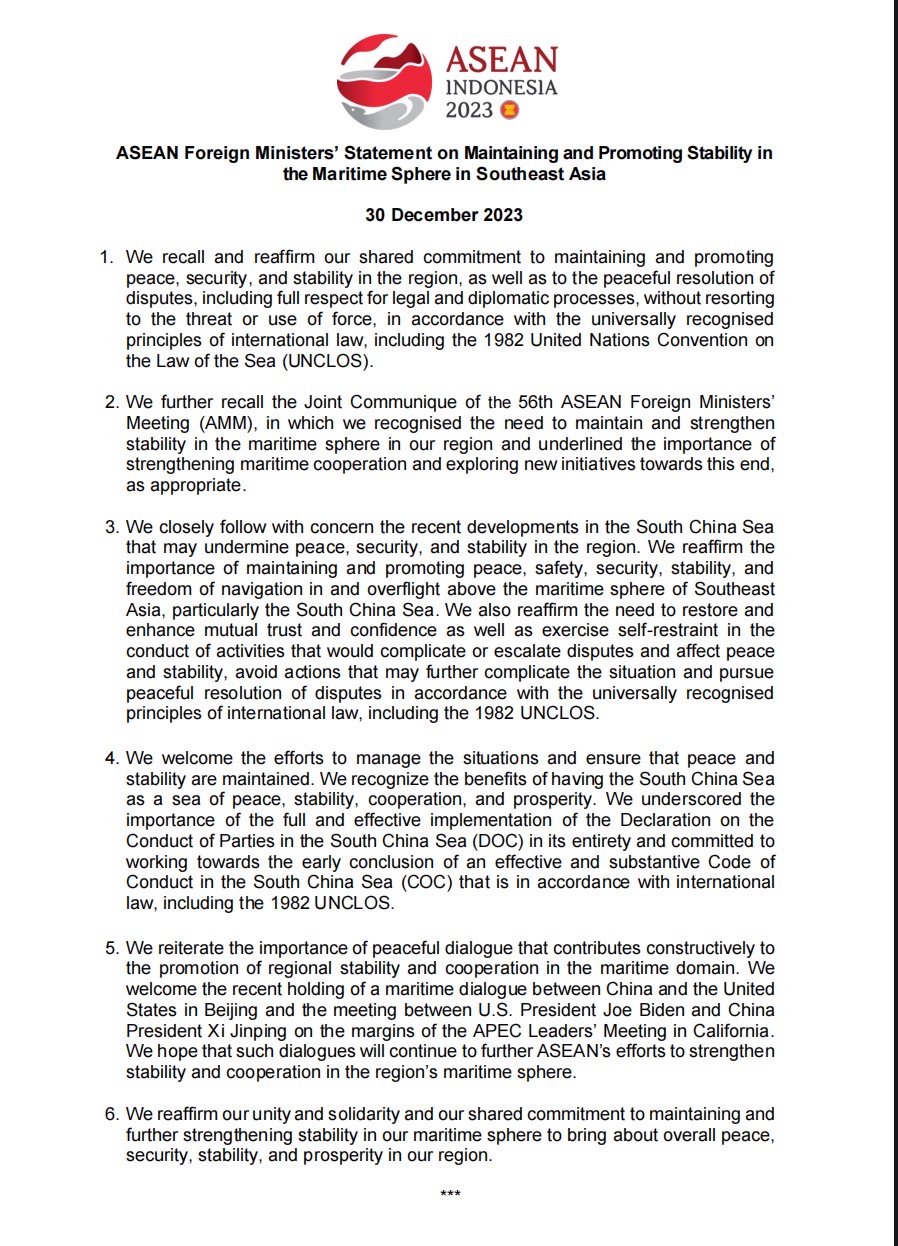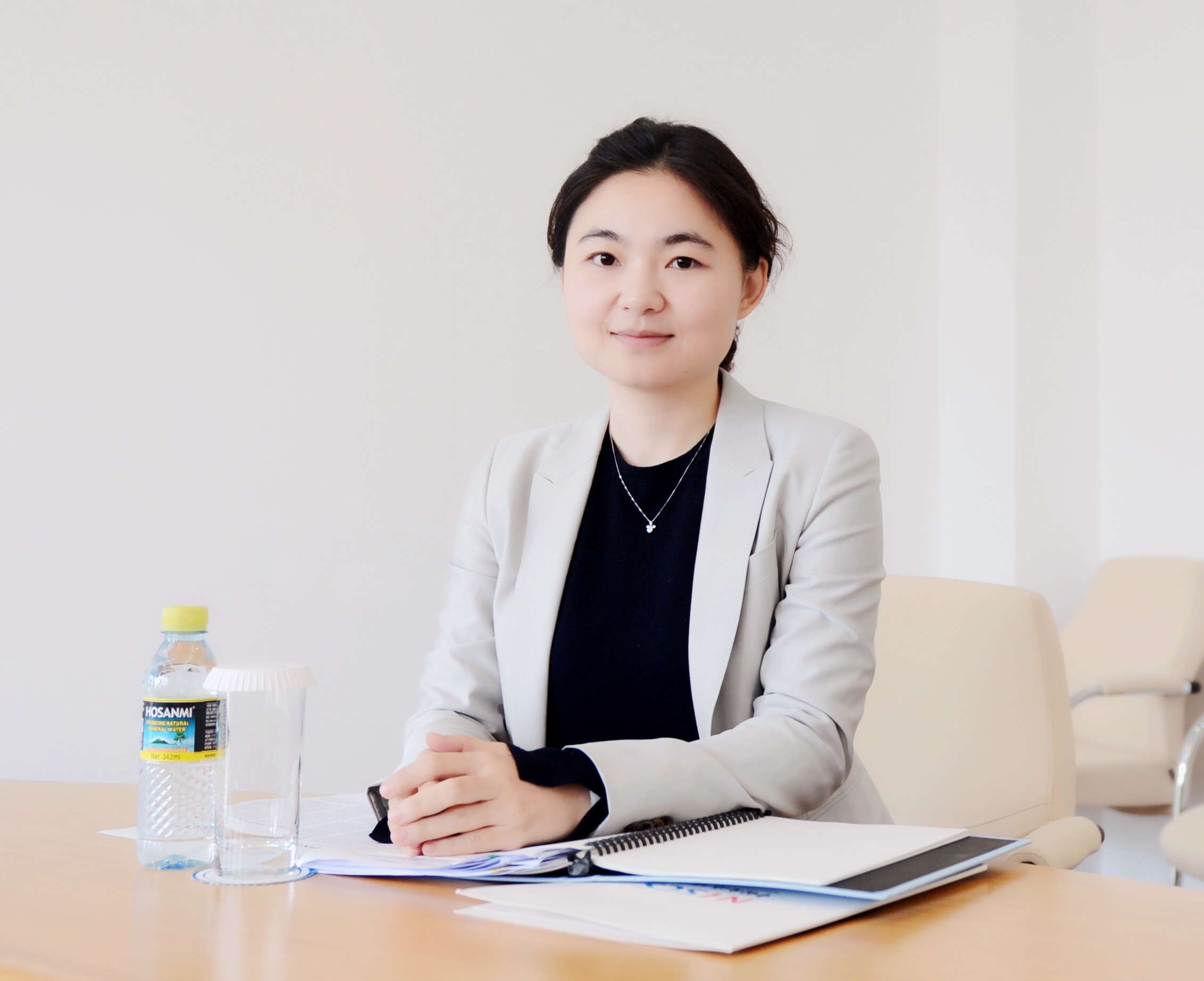The ASEAN Foreign Ministers’ Statement on 30 Dec. 2023 reveals the position of the regional states on regional maritime rules and the situation in the South China Sea at present as well.[1] The regional maritime rules should respect and protect the common interest of China and ASEAN members, especially the interests of peace, safety, security, stability, and prosperity.

The ASEAN Foreign Ministers’ Statement on 30 Dec. 2023
First of all, the six-point Statement has emphasized the importance of the DOC, which was implemented by ASEAN member States and China for more than 20 years. The terms it uses, originate from the DOC and reveal the object and purpose of the DOC. For example, it reaffirms the substantial commitments under Paragraphs 4 and 5 of the DOC by reaffirming “the need to restore and enhance mutual trust and confidence as well as exercises self-restraint in the conduct of activities that would complicate or escalate disputes and affect peace and stability” (almost the same as Paragraph 5), and the need to “pursue peaceful resolution of disputes in accordance with the universally recognized principles of international law, including the 1982 UNCLOS” (Paragraph 4).
Paragraph 5 is considered as the essential and fundamental commitment of DOC, which was respected by 11 Parties and shall be insisted on in the future. It underscored that Parties undertake to refrain from “action of inhabiting on the presently uninhabited islands, reefs, shoals, cays, and other features”. With the joint efforts of China and ASEAN member States, none of the maritime features has been newly inhabited in the South China Sea in the past decade, which constitutes the cornerstone for the peace and stability of the region. It is the Philippines that attempts to construct permanent military station and declares to build civilian infrastructures on the Second Thomas Shoal to change its uninhabited status, which constitutes a serious violation of DOC. If the uninhabited status of the Second Thomas Shoal cannot be maintained, the joint efforts of the regional States would be undermined and the foundation of the regional order for maintaining stability and peace would be eroded.
Despite that, the Statement has explicitly underscored “the importance of the full and effective implementation of the Declaration on the Conduct of Parties in the South China Sea (DOC) in its entirety and committed to working towards the early conclusion of an effective and substantive Code of Conduct in the South China Sea (COC) that is in accordance with international law, including the 1982 UNCLOS”. The full and effective implementation of the DOC is the consensus of the regional States and the basis of the COC consultation. Violation of the DOC by inhabiting Second Thomas Shoal would definitely break the good environment of the COC consultation.
Thus, the regional rules and maritime order are not based on the amorphous and discriminatory so-called “Rule-Based Order”, but rely on the “universally recognized principles of international law, including the 1982 UNCLOS”, the regional instruments for maintaining the peace and stability, such as DOC and the COC in the future, the CBMs at bilateral level as well as the good practice between the parties to manage disputes at sea. The regional rules and maritime order are not made by any big powers, but based on common interests of China and ASEAN members, and shall be determined and interpreted by those parties. The conclusion of the DOC is the first successful step to establish the regional order, and it is promising that ASEAN member States and China would follow this approach to improve and optimize the regional rules in the future.
The Philippines has proposed several times to work out a separate code of conduct with Vietnam and Malaysia. This proposal will be a big challenge to ASEAN unity, at the same time complicates the South China Sea dispute, and even upsets the COC apple cart. It seems that the Marcos administration is trying to involve Vietnam and Malaysia in its competition against China in the Spratlys to strengthen its bargaining chips and gain more support from ASEAN countries. However, Vietnam and Malaysia are unlikely to work with the Philippines on the seperate COC, and it is worth notice that ASEAN is already in a crisis of division.
Unlike the Philippines, Vietnam prefers to handle its dispute with China cautiously through diplomatic channels without jeopardizing bilateral relations. Malaysia, on the other hand, has traditionally taken a non-confrontational approach to the South China Sea disputes. Despite the tense situation in the SCS, the Malaysian government has always emphasized diplomatic solutions. Also, the better-growing China-Malaysia relation can be seen in President Anwar's March 2023 meeting with Chinese President Xi Jinping in Beijing and the deepening cooperation in the BRI projects.

Chinese President Xi Jinping met with Prime Minister Datuk Seri Anwar Ibrahim of Malaysia, March 31, 2023
The Filipino public, on the other hand, is not as concerned about the SCS dispute with China as President Marcos Jr. is. According to the results of a survey released by Pulse Research Center on 8 Jan. 2024, the 3 issues that the Filipino people are most concerned about promoting employment and eradicating poverty, combating corruption, and reducing taxes.
The Code of Conduct in the South China Sea aims at establishing rules and order in the region, which will bound all 11 countries. Some countries, especially the globally big powers, often "sign but not ratify" or "sign and then withdraw" from a treaty because they do not want to be bound by any rules. China has always been an active participation in negotiating the COC, which have already demonstrated China's goodwill and its responsibility as an important coastal State in the South China Sea to be restrained by regional rules.
Since the resumption of the COC consultations in September 2013, landmark developments have been secured successively over the years. Hotline Communications among Senior Officials of the Ministries of Foreign Affairs of China and ASEAN Member States in Response to Maritime Emergencies and Hotline Communications on Search and Rescue among China and ASEAN Member States were established in April 2016. A COC framework was instituted in May 2017. The Single Draft Negotiating Text of the Code of Conduct (COC) was developed in August 2018. In 2023, under Indonesia’s chair, the China-ASEAN joint statement sets out a goal of reaching the COC in 3 years on July 31st. This October, the 21st China-ASEAN senior officials meeting announced the start of the third reading of SDNT. Many ASEAN member states have noted repeatedly that they are quite satisfied with the current progress and looking forward to the early conclusion.
Fundamentally, the core of the South China Sea dispute is sovereignty of the features and over maritime jurisdiction. It involves history, law, security, and geopolitics; thus, it is the most complicated maritime dispute globally. The Philippines' encouragement of Vietnam and Malaysia to formulate a separate COC and for ASEAN to explicitly criticize China in the joint statement, and to hold ASEAN hostage to pressure on China, will only plunge ASEAN into a crisis of division.
Pointing fingers at each other will not solve the current problem, and targeting all the accusations at China will not solve the problem even more. The littoral countries of the South China Sea should work together to build a rule and order that suits our region and work together for a bright future of the South China Sea.
Reference
1] ASEAN Foreign Ministers’ Statement on Maintaining and Promoting Stability in the Maritime Sphere in Southeast Asia,
https://asean.org/wp-content/uploads/2023/12/Final-Draft-ASEAN-FMs-State...


